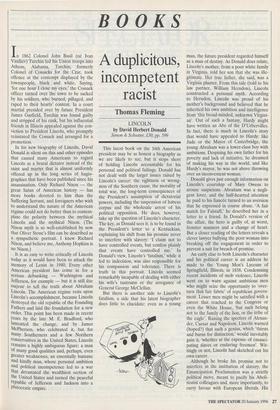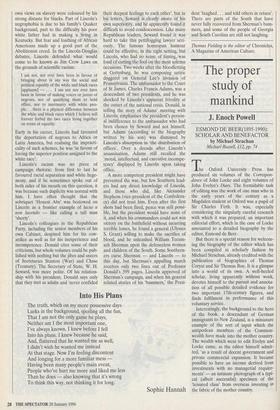BOOKS
A duplicitous, incompetent racist
Thomas Fleming
LINCOLN by David Herbert Donald Simon & Schuster, £30, pp. 599 In 1862 Colonel John Basil (ne Ivan Vasiliev) Turchin led his Union troops into Athens, Alabama. Turchin, formerly Colonel of Cossacks for the Czar, took offence at the contempt displayed by the townspeople, black and white. Saying, `for one hour I close my eyes,' the Cossack officer turned over the town to be sacked by his soldiers, who burned, pillaged, and raped to their hearts' content. In a court martial presided over by future President James Garfield, Turchin was found guilty and stripped of his rank, but his influential friends in Illinois appealed against the con- viction to President Lincoln, who promptly reinstated the Cossack and arranged for a promotion.
In his new biography of Lincoln, David Donald is silent on this and other episodes that caused many Americans to regard Lincoln as a brutal dictator instead of the saint and martyr that is almost uniformly offered up in the long series of hagio- graphies that have been published since his assassination. Only Richard Nixon — the great Satan of American history — has more books devoted to him than the Suffering Servant, and foreigners who wish to understand the nature of the American regime could not do better than to contem- plate the polarity between the mythical Lincoln and the mythical Nixon. (The Nixon myth is so well-established by now that Oliver Stone's film can be described as a sympathetic portrait. I knew Richard Nixon, and believe me, Anthony Hopkins is no Nixon.) It is as easy to write critically of Lincoln today as it would have been to attack the memory of Lenin in 1940. Every other American president has come in for a serious debunking — Washington and Jefferson, for example — but it is still lese majeste to tell the truth about Abraham Lincoln. The American regime rests upon Lincoln's accomplishment, because Lincoln destroyed the old republic of the Founding Fathers and laid the foundation for a new order. This point has been made in recent years by the late M. E. Bradford, who lamented the change, and by James McPherson, who celebrated it, but for many Southerners and a few Northern Conservatives in the United States, Lincoln remains a highly ambiguous figure: a man of many good qualities and, perhaps, even greater weaknesses, an essentially humane and kindly man, whose personal ambition and political incompetence led to a war that devastated the wealthiest section of the United States and turned the peaceful republic of Jefferson and Jackson into a plutocratic empire. This latest book on the 16th American president may be as honest a biography as we are likely to see, but it stops short of holding Lincoln accountable for his personal and political failings. Donald has not dealt with the larger issues raised by Lincoln's career: the rightness or wrong- ness of the Southern cause, the morality of total war, the long-term consequences of the President's assumption of dictatorial powers, including the suspension of habeas corpus and the wholesale arrest of his political opposition. He does, however, take up the question of Lincoln's character. The key, as Donald sees it, is to be found in the President's letter to a Kentuckian, explaining his shift from his promise never to interfere with slavery: 'I claim not to have controlled events, but confess plainly that events have controlled me.' In Donald's view, Lincoln's 'fatalism,' while it led to indecision, was also responsible for his compassion and tolerance. There is truth in this portrait. Lincoln seemed remarkably incapable of dealing with either his wife's tantrums or the arrogance of General George McClellan.
But there is another side to Lincoln's fatalism, a side that his latest biographer does little to elucidate: even as a young man, the future president regarded himself as a man of destiny. As Donald does relate, Lincoln's mother, from a poor white family in Virginia, told her son that she was ille- gitimate. Her true father, she said, was a Virginia planter. From this tale (told to his law partner, William Herndon), Lincoln constructed a personal myth. According to Herndon, Lincoln was proud of his mother's background and believed that he inherited his own ambition and intelligence from 'this broad-minded, unknown Virgini- an'. Out of such a fantasy, Hardy might have written an Abe of the D'Urbervilles. In fact, there is much in Lincoln's story that would have appealed to Hardy: like Jude or the Mayor of Casterbridge, the young Abraham was a lower-class boy with ambitions. Despising his own father for his poverty and lack of initiative, he dreamed of making his way in the world, and like Hardy's mayor, he was not above throwing over an inconvenient woman.
Donald gives just enough information on Lincoln's courtship of Mary Owens to arouse suspicions. Abraham was a negli- gent lover, and the half-hearted attention he paid to his fiancée turned to an aversion that he expressed in coarse abuse. 'A fair match for Falstaff,' he described her in a letter to a friend. In Donald's version of the affair, the hero is guilty of, at worst, frontier manners and a change of heart. But a closer reading of the letters reveals a clever lawyer bullying the poor woman into breaking off the engagement in order to prevent a suit for breach of promise.
An early clue to both Lincoln's character and his political career is an address he made to the Young Men's Lyceum of Springfield, Illinois, in 1838. Condemning recent incidents of mob violence, Lincoln went on to warn against ambitious men who might seize the opportunity to 'over- turn that fair fabric' of republican govern- ment. Lesser men might be satisfied with a career that reached to the Congress or even the White House, tut such belong not to the family of the lion, or the tribe of the eagle'. Raising the spectres of Alexan- der, Caesar and Napoleon, Lincoln warned (hoped?) that such a genius, which 'thirsts and burns for distinction,' would inevitably gain it, 'whether at the expense of emanci- pating slaves or enslaving freemen'. Wit- tingly or not, Lincoln had sketched out his own career.
Although he broke his promise not to interfere in the institution of slavery, the Emancipation Proclamation was a strictly political move, meant to pacify his Aboli- tionist colleagues and, more importantly, to curry favour with European liberals. His own views on slavery were coloured by his strong distaste for blacks. Part of Lincoln's negrophobia is due to his family's Quaker background, part to the difficulty his poor white father had in making a living in Kentucky. But fear and loathing of African Americans made up a good part of the Abolitionist creed. In the Lincoln-Douglas debates, Lincoln defended what would come to be known as Jim Crow Laws on the grounds of scientific racism:
I am not, nor ever have been in favour of bringing about in any way the social and political equality of the white and black races [applause] — ... I am not nor ever have been in favour of making voters or jurors of negroes, nor of qualifying them to hold office, nor to intermarry with white peo- ple... there is a physical difference between the white and black races which I believe will forever forbid the two races living together on terms of equality.
Early in his career, Lincoln had favoured the deportation of negroes to Africa or Latin America, but realising the impracti- cality of such schemes, he was 'in favour of having the superior position assigned to the white race'.
Lincoln's racism was no piece of campaign rhetoric: from first to last he favoured racial separation and white hege- mony, and if he sometimes spoke out of both sides of his mouth on this question, it was because such duplicity was normal with him. I have often thought that the sobriquet 'Honest Abe' was bestowed on Lincoln as a frontier example of lucus a non lucendo — like calling a tall man `shorty'.
Lincoln's colleagues in the Republican Party, including the senior members of his own Cabinet, despised him for his cow- ardice as well as for his inexperience and incompetence. Donald cites some of their criticisms, but whole volumes could be pub- lished with nothing but the jibes and sneers of Secretaries Stanton (War) and Chase (Treasury). The Secretary of State, W. H. Seward, was more polite. Of his relation- ship with his president, Donald says only that they met as adults and 'never confided their deepest feelings to each other', but in his letters, Seward is clearly aware of his own superiority, and he apparently found it difficult to avoid condescension. Like many Republican leaders, Seward found it was hard to take this pettifogging lawyer seri- ously. The famous homespun humour could be effective, in the right setting, but Lincoln, who had no sense of timing, was fond of cutting the fool on the most solemn occasions. Two weeks after the bloodletting at Gettysburg, he was composing satiric doggerel on General Lee's invasion of Pennsylvania. The ambassador to the Court of St James, Charles Francis Adams, was a descendant of two presidents, and he was shocked by Lincoln's apparent frivolity at the outset of the national crisis. Donald, in telling the story of Adams' meeting with Lincoln, emphasises the president's person- al indifference to the ambassador who had been chosen by Seward and not himself, but Adams (according to the biography written by his son) was dismayed by Lincoln's absorption in 'the distribution of offices'. Over a decade after Lincoln's assassination, Adams still recalled the `moral, intellectual, and executive incompe- tency' displayed by Lincoln upon taking office.
A more competent president might have prevented the war, but few Southern lead- ers had any direct knowledge of Lincoln, and those who did, like Alexander Stephens (vice-president of the Confedera- cy) did not trust him. Even after the first shots had been fired, peace was still possi- ble, but the president would have none of it, and when his commanders could not win victory on the battlefield without incurring terrible losses, he found a general (Ulysses S. Grant) willing to make the sacrifice of blood, and he unleashed William Tecum- seh Sherman upon the defenceless women and children of the South. Some Southern- ers curse Sherman — and Lincoln — to this day, but Sherman's appalling march receives only two lines out of Professor Donald's 599 pages. Lincoln approved of Sherman's campaign, and when his general related stories of his 'bummers,' the Presi- dent 'laughed . . . and told others in return'. There are parts of the South that have never fully recovered from Sherman's bum- mers, and some of the people of Georgia and South Carolina are still not laughing.
Thomas Fielding is the editor of Chronicles, A Magazine of American Culture.



























































 Previous page
Previous page